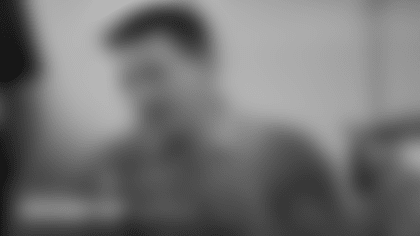If the Seattle Seahawks enjoy a successful 2016 season, it will not be because of carne asada tacos. What those carne asada tacos represent, however, has plenty to do with Seattle's success this year and in previous seasons under head coach Pete Carroll and general manager John Schneider.
But before we get to the tacos, which are delicious, by the way, first a story about Carroll, Hall of Fame coach Bud Grant and analytics. Yes, this story is a little bit all over the place, but ultimately it's a story about Carroll and the culture he and general manager John Schneider have built in Seattle, and when it comes to Carroll, things tend to move at high speeds and occasionally appear chaotic even when they're not, so just bear with us.
Back when Carroll was a young assistant coach in Minnesota in the 1980s, Grant sensed a change coming in football. Despite his old-school reputation, Grant was a forward thinker, and he saw that computers were going to greatly alter the way teams could study their own tendencies, and more importantly, their opponents'.
"Bud was one of the early adopters of football analytics," said Brian Eayrs, the Seahawks' research analyst. "He was really creative, really innovative. He saw in the 1980s that football was starting to turn into a world of information that could be easily gathered and summarized with a computer."
When Grant realized he needed somebody to help the Vikings make sense of the new information computers were making available to them and other teams, Carroll told his boss that he knew a guy—Carroll always knows a guy—which is how the Vikings came to hire Mike Eayrs, Brian's father, who went on to a long career in the NFL with Minnesota and Green Bay. Decades later, Carroll decided his Seahawks needed to bolster their research department, so he reached out to the elder Eayrs, who told Carroll about his son Brian, a former Division III coach who was working for STATS, LLC at the time.
So where are we going with all of this?
Of all the things that help shape Carroll's philosophy on coaching—on life really—one of the most important is an idea that sounds simple, but is actually rather complex in its application: helping people be the best they can be. And an important distinction to make here is that the focus isn't on helping an athlete be the best football player he can be, but on helping that individual be the best person he can be. Take care of that first, and the football part will follow.
As Dr. Michael Gervais, a high performance psychologist who works closely with the Seahawks describes it, "We are humans first, then we're human doers."
"It's really important to us to reach into as much as we can be involved," Carroll said. "It's the whole package of the player that's crucial in helping him be his best, because we see things carry over so much. We recognize that their off-the-field life has something to do with their on-field life. So we're trying to support them and help them find their best in all areas. We take a lot pride in doing that."
One of the many keys to Carroll’s success as a coach is the way he has embraced individualism. A big part of that is simply allowing players to be themselves, but there's more to it than not trying to suppress Michael Bennett or Richard Sherman's outspokenness, or than not trying to contain Doug Baldwin's passion. For the Seahawks to truly be at their best, Carroll and Schneider want players, coaches, scouts and pretty much everyone in the building to have at their disposal resources that can help them maximize their potential. For some, that's Dr. Gervais, for others it's Maurice Kelly, the team's vice president of player engagement, while for others still it's nutritionist Michele Clarke-Mason and executive chef Mac McNabb, or director of player health and performance Sam Ramsden, or Eayrs, whose research helps coaches and personnel people self-scout and also spot, "league-wide trends that might help us win."
"Everybody that contributes has a very crucial role," Carroll said. "And some guys have a more crucial role with some players than others, it depends on the makeup and what the situation is for the young man. Dr. Gervais and Mo (Kelly) and everyone else fit in where they do to do their things they do well. That's why it's really important to have a really diverse group with various skills so we can be there to meet the needs of different players."
Not every player utilizes those resources equally, but they all appreciate having so much available to them. And they appreciate a coach who encourages them to spend the few weeks not just preparing for the season, but also openly discussing pressing social issues while engaging in healthy debates on how best to express themselves and their concerns.
"One of the things Pete really focuses on is the entirety of the person," Sherman said. "He focuses on your purpose beyond the game. That's really important, because a lot of coaches don't think about that—they're trying to get as much as they can out of a player while he's in their building, then once he's not, they couldn't care less. Pete's a little different. As much as a coach can care about a player within the business of football, he does. He maximizes that. That's shown by his action, in having all these resources in the building. They don't have to have that, that's not a mandatory thing every team does, but that's something he believes is necessary to help his players."
Added receiver Baldwin: "One of the things Pete always stresses is that whatever we're doing, we're going to compete at the highest level, compete to be the best at it. He exemplifies that both on and off the field. He puts people in place who will help us off the field and allow us to have healthy lives off the field, and in turn that makes it healthier for us when we come in this locker room. We have less stress outside of the locker room, which enables us to play at a higher level."

"When you're playing for somebody who you know cares for you, you want to give it your all 24/7"
Maurice Kelly is running late. The former NFL defensive back is still in his office, well past when he had planned to be, deep in conversation with a handful of players. The discussion in his office, located in the players' lounge just outside the locker room, has nothing to do with the game he used to play and that currently employs everyone else in his office.
"The football stuff is covered," Kelly said. "Most conversations I have with our players have nothing to do with football. It's all about being the best dads, the best husbands, the best teammates they can possibly be. I think there's a consensus around the building that if we help them be the best all of those things, it will translate to them being the best football players they can be. Just worrying about taking care of themselves. It's easy to tell somebody to leave all their problems at the door and come in and focus on the work, but we know that's not how things work.
"We're talking about life, we're talking about issues that are going on in this country, we talk about issues they have going on at home. When it comes to Pete, just to be able to create the environment to be able to do that, it's unheard of."
When receiver Ricardo Lockette was forced into early retirement by a neck injury, one of the people Carroll mentioned multiple times was Kelly, who is instrumental in not just helping players deal with life outside of football while they're playing, but also prepare for life after football.
"This team embraces that a lot," linebacker Bobby Wagner said. "Especially over the last year, I think Coach Carroll has really wanted to try to figure out how to help us with off the field stuff, because he understands that this game only lasts so long. He has really tried to help us with our endeavors outside of these walls.
"The person who really helps me the most is Mo Kelly, just trying to figure out what we want to do, the path we need to take…Their care to help us get to different things that we want to get into outside of football, whether it's foundations, charity, businesses, I think that's different from the rest of the league. I feel like everyone else is just focused on trying to use the players as long as they can, then when they're done, that's it. When you're playing for somebody who you know cares for you, you want to give it your all 24/7. That definitely helps me play harder, because I know they care about the Bobby on the field, but also the Bobby off the field."
Defensive end Cliff Avril is one of the most experienced players in Seattle's locker room, and in the past he has admitted it took a little while to fully embrace Carroll's unconventional ways after signing with the Seahawks in 2013. But heading into his fourth season with the Seahawks, Avril now sees a lot of value in the way Carroll does things.
"It's pretty cool," Avril said. "We talk about a lot of things that a lot of coaches probably wouldn't want to even touch. A lot of coaches just want to be football coaches, 'I'm not worried about the things you have going on at home,' type people, but he's more engaged with who you are as a person, which is pretty cool. And it's genuine, so I think it helps us overall as people, and it makes us better football players. You're allowed to be yourself. Most other places, it's not like that. Work is work, and that's what it is. It's kind of militant, in a sense. It's not like that here at all."

The value of mindset
Dr. Michael Gervais has worked with high-profile athletes, celebrities and leaders in the business world, and what he sees in what Carroll and Schneider have built in Seattle stands out even in the elite company he keeps.
"What I have been able to witness from all the other clubs I've worked with, what's happening with the Seahawks is capturing one of those really rare moments in time where people are sharing the experience together, and it's really unique," said Gervais, who works with the team on a weekly basis, consulting with players, coaches and the personnel department.
While Carroll and his coaching staff prepare players for games in the more traditional sense, and the strength and condoning people get players ready physically, Gervais' job is to make sure players and coaches are in the right mindset to perform at their very best.
"For those who want to be their very best, there are three things humans can train—your body, your craft and your mind," Gervais said. "Pete is a forward-thinking coach; he's looking at the horizon. He has always done that his entire life. He understands the value of mindset. You can talk about the value of mindset, or you can train the mindset of people to pursue their potential. And when you actually train mindset, you increase chances of athletes finding their ideal competitive mindset. That's the central theme of his program, it has been for a long time, helping people compete to be their best. And if we're working toward that direction, competing to have a great mindset in moments that are intense, moments that are rugged, moments that are hostile—can you have your ideal mindset in those moments as well? He's looking for every advantage to be able to see how far collectively this group can go."
Gervais has worked with Carroll and the Seahawks since 2012, and from their earliest conversations, the two hit it off because of the way they see things so alike in so many instances.
"The first thing most people see in Pete is his incredible enthusiasm and energy for life, and what is often missed is his intensity, his ability to manage many variables at one time," Gervais said. "His deep interest in caring about people, loving people, wanting to understand who a person is so he can celebrate them to become their very best. I don't think people appreciate the complexity and his appreciation for meaningful relationship.
"It's the person first, then the performer. And getting that orientation correct is actually counterintuitive to the way many coaches coach, because they are singularly focused on the outcome that is necessary for success, for what most people consider success. The wisdom and science around helping people become their very best is to have the mental discipline and the mental fortitude to invest in the process. The process is broken down to increasing the frequency of somebody being completely present, and being able to master the elements that are 100 percent under your control."

"The quest for readiness"
When it comes to getting players ready from a physical standpoint, the Seahawks rely heavily on head athletic trainer Donald Rich and his staff, on physical therapist Michael Tankovich, and on their top-notch medical staff. But in addition to those more traditional methods of keeping players healthy is the work done by Sam Ramsden, Seattle's director of player health and performance.
"I like to look at it as, coaches—strength and conditioning coaches, head coaches, position coaches—they all are preparing their players to play," Ramsden said.
But sometimes even when players are coached as well as they can be, and they're in perfect physical shape thanks to Rich and company, they still might not quite feel right on game day, and that's where Ramsden comes in.
"Sometimes a player will get to Sunday's game, and they'll do everything just the way they're supposed to, but they don't feel great doing it," Ramsden said. "So what I'm most interested in is understanding the quest for readiness. Readiness is knowing that you know what to do, but also feeling that you can express it physically at the highest level. You can be prepared and know what to do and be fast enough and healthy enough, but you wake up that day, and for whatever reason you don't feel right, then you can't really express your true level of talent. For whatever reason they might be tired, they may not be getting enough sleep, there might be a lack of energy, there might be a level of soreness they couldn't overcome. So my hope is to be able to put people in place to help us understand our players at as deep a level as possible, so that in forming that relationship with them, we can figure out what can be the individual algorithm or equation a player needs from Sunday to Sunday to not only know what they're doing, but to be able to do it the highest level."
The way Ramsden sees it, every team at this level has good coaching and top-caliber athletes, so what often can make the difference on Sundays is being the team that "has the better readiness on the day of the game."
Part of finding that readiness is customizing workloads for specific players. By having players check in each day on Microsoft Surface tablets to enter their perceived level of exertion, as well as their energy level and soreness level, then comparing that to data they get form GPS units some players choose to wear, Ramsden and applied sports scientist Dean Riddle can evaluate that information, then add "our own kind of secret sauce we use to try to asses and quickly adjust loads in practice for players. That's something over the last four or five years that we've been refining."
With that information, the Seahawks can then determine, as Ramsden describes it, "This guy can take on the work, but this guy might be susceptible to injury, this guy might not be able to take on a lot of work. This guy we've got to be careful with. It could be a veteran player, it could be a player with an arthritic or orthopedic condition we have to be smart with. Trying to put all those pieces together for each coach so in turn they can practice that player in an optimal way. We're far from understanding what's optimal, but we're on the quest for it."
Four years ago, Baldwin battled injuries as he tried to build off of a successful rookie season. Looking back, it was easy to him to identify one of the causes, which was that he overdid it that offseason and in camp trying to prove himself. In part because of the work of Ramsden and his staff, Baldwin now knows how to work smarter and maximize what he gets out of practice.
"Sam and Dean, they can take the analytics and give us a plan on a week-to-week basis on how much load we're doing, and they tailor our practices so we're at our optimal point athletically and mentally when we get to Sundays," Baldwin said.

"They're just getting smarter about their health"
Oh yes, we still need to come back to those carne asada tacos, don't we?
Convincing players to eat a healthy diet is a big part of what McNabb, the team's executive chef, and Clarke-Mason, the nutritionist do on a daily basis, but there's also an open dialogue between them and the players. McNabb calls his son Stuart, one of the team's cooks, "our ears" when it comes to knowing what the players want. So when Richard Sherman told Stuart McNabb a couple years ago that he wanted a more authentic version of the taco bar the kitchen had been putting together on occasion, they listened. Now the taco bar sometimes includes carne asada, or shredded beef instead of ground beef. And because Bobby Wagner likes sloppy joes, those have been known to turn up at lunchtime.
"I always think of it like healthy comfort food," Mac McNabb said. "If possible, it's always organic, but things they like. If we don't keep them happy, they're going to go across the street to get fast food."
Of course making players happy isn't the only goal. Keeping them healthy, and in a way that maximizes performance, is also crucial.
"I have a biased opinion, but I think nutrition is huge," said Clark-Mason, who has been working with the team for four years after working individually with some players prior to that. "It affects the integrity of their bodies, how easily they can get injured, hydration affects their cramping, how quickly they're going to recover. Nutrition is essential in a healthy inflammation response, so that's recovery time. If they have specific deficiencies, that can affect reflex time, so it's huge."
Some players are all-in on what Clark-Mason is preaching, while others take a little more work, so part of her job is understanding how much she can push when it comes to changing eating habits.
"There definitely has to be a trust established," she said. "Players realize that if they're not interested, they're not obliged, but I'm there for support. I definitely customize what I'm suggesting based on the player. You have the very, very disciplined player that are discussing specific amino acids with me, or timing when they should be eating what, and then we have players who just getting them to eat can be a challenge. So we kind of customize it for the whole range based off the individual. I think players seeing me do that—like not taking someone who only eats cereal and juice and scones in the morning, and trying to put them on a very pristine diet. It's taking it in steps. So that's gotten me more buy-in."
A big focus this year is on players eating the right ratio of different food groups, which is why when players enter the cafeteria, they see a tablet with a picture of that day's meal offering on a plate in proper portions. And just as important as making sure players are eating the right foods in proper portions is avoiding ones that can be harmful.
"We had a player who had a dairy sensitivity and didn't realize it," Clarke-Mason said. "He was a very good player prior to that, and started avoiding dairy and just got that little bit of an edge. We've had players who did not eat well and were kind of prone to being sore all week, but they've got to the point where on Wednesday they're feeling like themselves. Then it's just fine-tuning—like this last offseason, I had six guys texting me fairly regularly asking, 'Hey, this is my goal, now what about this? How do I tweak that?' Those guys accomplished those goals this offseason. I think just having the resource has created the buy-in instead of wanting to eat better but not knowing where to start."
McNabb has been cooking for the Seahawks for 16 seasons, and he has seen a big change in the way players eat, and it has been a change for the better. Sure, some players still have unhealthy eating habits, and even the healthy eaters have their occasional indulgences, but there has been progress over the years.
"I think they're just getting smarter about their health," McNabb said. "A lot of guys asking questions. It's not like it used to be where it was steak and potatoes."
Healthy eating means local and organic whenever possible. McNabb won't serve farm-raised fish, he uses only grass-fed beef and organic, free-range chicken and eggs. The Seahawks have a local chicken guy who provides chicken, bones for broth and between 75 and 80 dozen eggs per week.
"They're more mature," McNabb said. "They're buying into the program to where, when it first started when Pete first got here, they still had to have their Cinnamon Toast Crunch, but now guys are steering away from that. They're eating lighter, less heavy. It used to be, eat as much as you can, then throw up at practice. Now they're smarter."
By listening to Clarke-Mason when it comes to his nutrition, Wagner feels like he has more energy now than he did as a rookie. Working with Clarke-Mason, Wagner discovered he was deficient in vitamin D, and he also cut out a lot of the fast food in his diet.
"I feel amazing," Wagner said. "She has definitely raised our awareness on everything, our eating habits. She helps me out a lot. She changed my diet, found out foods I need to eat more of, what I need to eat less of, it's amazing. I feel like I've got a lot more energy."
"We want to recognize their individuality as it fits into the team"
Add all of this up, and Carroll hopes he has built an environment where players can thrive as individuals, and as a result, help the team be its best. In a league built to produce parity—the draft, free agency and the salary cap make it nearly impossible to build a huge talent advantage in the NFL—Carroll strongly believes the way he and everyone else in the building help players be their best selves has contributed to the Seahawks making five playoff appearances in the past six years, winning one Super Bowl and going to another.
But putting resources in place to help players be the best they can and embracing individualism shouldn't be confused with letting players do whatever they want. There's plenty of discipline and structure to what the Seahawks do, even as players have more fun in Seattle than most people believed was possible in a successful NFL environment before Carroll's Seahawks started winning. Teams don't lead the NFL in scoring defense for four straight years if they're not disciplined, nor do they rank first in FootballOutsiders.com’s signature metric DVOA for four straight years. And without discipline and consistency, the Seahawks couldn't go 88 games, nearly five seasons worth of games dating back to Week 3 of the 2011 season, holding the lead or being within one score of the lead in the fourth quarter, nor could they go an NFL record 83 games having not lost by more than 10 points.
"They've got to be great teammates now," Carroll said. "We want to recognize their individualism as it fits into the team. We'll find the place to respect who they are and what they are as long as they comply. They've got to stay with us. That could easily be taken as, 'Hey, guys can do whatever they want here.' We could never function at this level if that was the way this went. These guys buy into being a part of this culture and they contribute in a way that fits, or somebody else is here. But I do think that it does give them a chance to find the best of themselves in this setting if we do it properly."
With Pete Carroll's future in Seattle secure following the 2016 season, take a look back at the head coach's best photos from his time with the Seahawks.
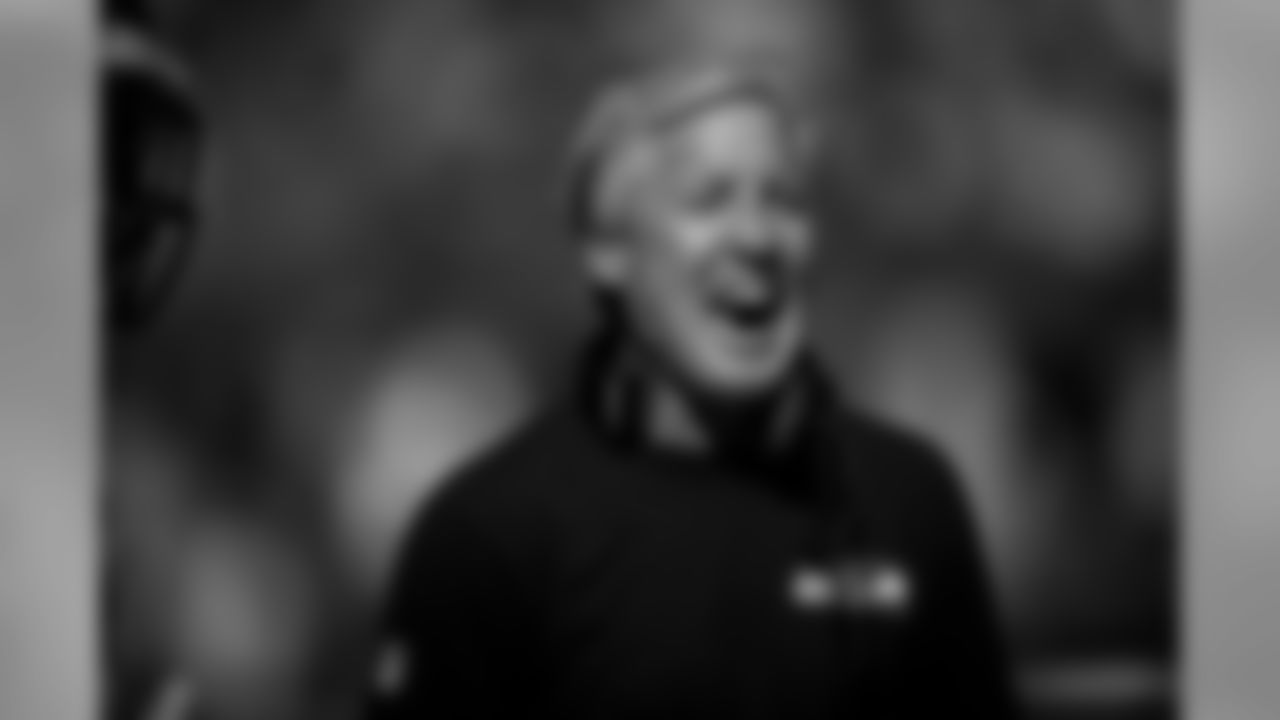
Head coach Pete Carroll is all smiles after a Lockett's touchdown.

Head coach Pete Carroll is all smiles after Kearse's touchdown padded Seattle's lead to 36-0.

Head coach Pete Carroll gets the first drops of the traditional Gatorade bath courtesy of Zach Miller and Russell Wilson at the end of Super Bowl XLVIII.

Head coach Pete Carroll holds the Lombardi Trophy along with team president Peter McLoughlin, owner Paul Allen and Bert Kolde on the victory platform.

Never mind that it was after 3am, two guys with energy to spare -- Seahawks head coach Pete Carroll and Seattle-based rapper Macklemore bounce on stage to the Seahawks unofficial anthem "Can't Hold Us" during the team's postgame party.

Glena and Pete Carroll hold hands as they exit the White House library. Seahawks players and coaches were able to visit many of the rooms in lower floors of the White House.

Head coach Pete Carroll brings the team up for the final time at CenturyLink Field this season as the next game will be on the road at MetLife Stadium in New Jersey.

Seahawks head coach Pete Carroll, flanked by running backs coach Sherman Smith, is all smiles in the fourth quarter.
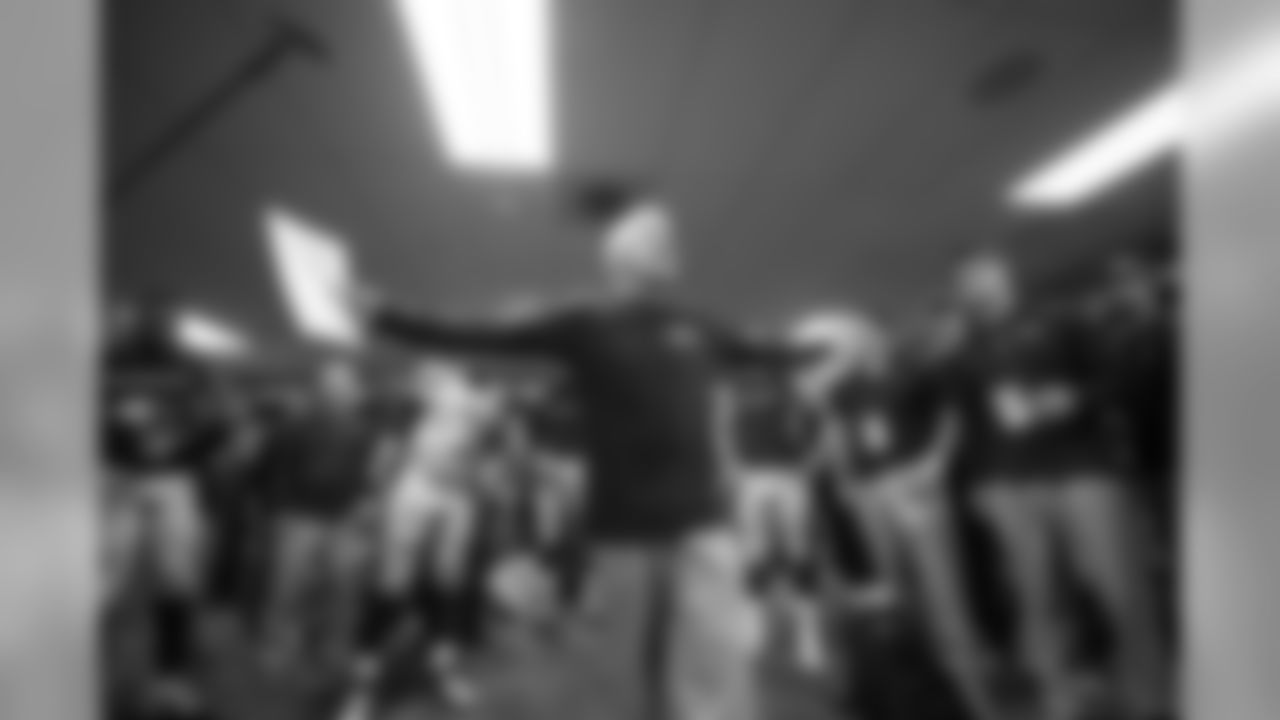
Head coach Pete Carroll talks to his team about the victory, which helps the Seahawks position themselves for a playoff run in the final weeks of the regular season.

Head coach Pete Carroll celebrates as in the bottom left corner of the frame, tight end Luke Willson crosses into the end zone for the two-point conversion. The two points meant that Green Bay could not win the game with a last second field goal, only tie to send the game to a possible overtime.

Head coach Pete Carroll waves to family members after taking the field with his team during pregame ceremonies.

At the end of a brief pregame talk, head coach Pete Carroll and the Seahawks let out a yell.

Head coach Pete Carroll congratulates receiver Doug Baldwin after the first of Baldwin's three touchdowns on the day.

Seattle head coach Pete Carroll celebrates after he watched his team score 21 unanswered points to cut the lead to 31-21 in the fourth quarter.

After watching his Seahawks dominate the Baltimore Ravens on the road in a 35-6 victory, head coach Pete Carroll jumped on top of the lockers to make his postgame comments to the team.
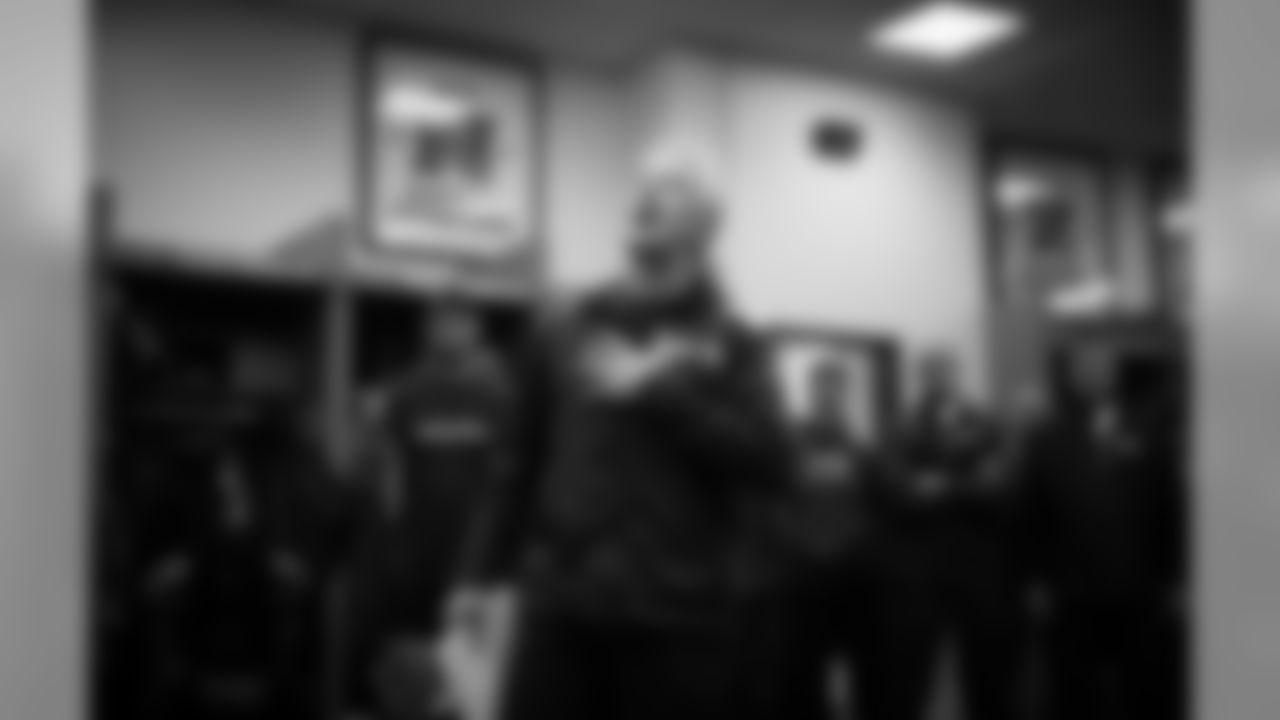
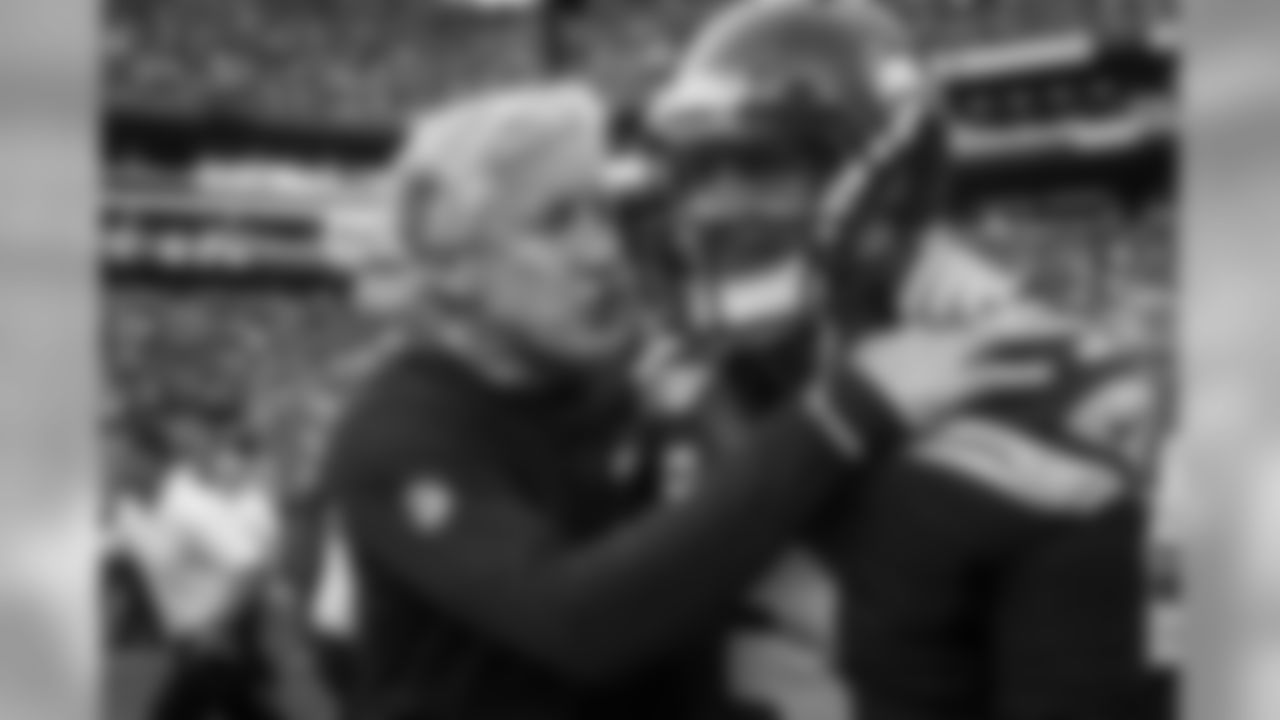
Head coach Pete Carroll celebrates with his quarterback Russell Wilson after the game-winning drive in overtime.

Head coach Pete Carroll talks to the team at the end of walk thru with the Charlotte skyline provides the backdrop.

Head coach Pete Carroll lets out a laugh as Earl Thomas suggests strategy in the final minutes of the 17-7 victory for the Seahawks.

Head coach Pete Carroll congratulates Russell Wilson after Wilson's 80-yard touchdown pass to Luke Willson in the second quarter.

Head coach Pete Carroll hugs Doug Baldwin as the entire team gathers on the Seahawks sideline before kickoff.

Head coach Pete Carroll greets defensive players DeShawn Shead and Cary Williams on the sideline.

Seahawks coach Pete Carroll reacts after Russell Wilson connected with Tyler Lockett for a 27-yard touchdown in the fourth quarter.
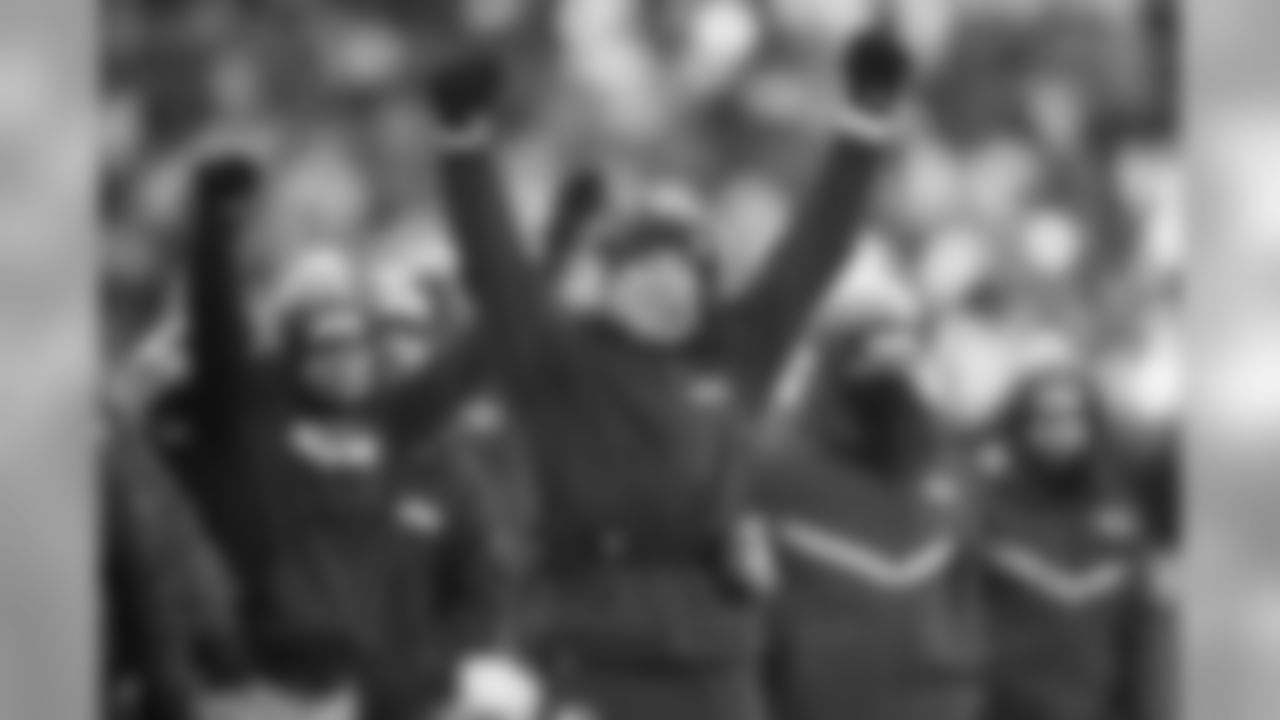
Head coach Pete Carroll cheers on the sidelines after the Seahawks scored for the first time in the game to cut the lead to 9-7.

Head coach Pete Carroll is fired up in the locker room after the victory.

Head coach Pete Carroll address the team at the end of walk-thru on Saturday, which took place near downtown Charlotte, seen in the background.

Head coach Pete Carroll smiles after accepting a game ball from Richard Sherman. The ball marked Carroll's 101st victory in the NFL.

Head coach Pete Carroll is greeted by Seahawks fans as he makes his way to the field.

Head coach Pete Carroll is all smiles as the clock runs out on his team's 27-9 victory. At right is running backs coach Sherman Smith.






